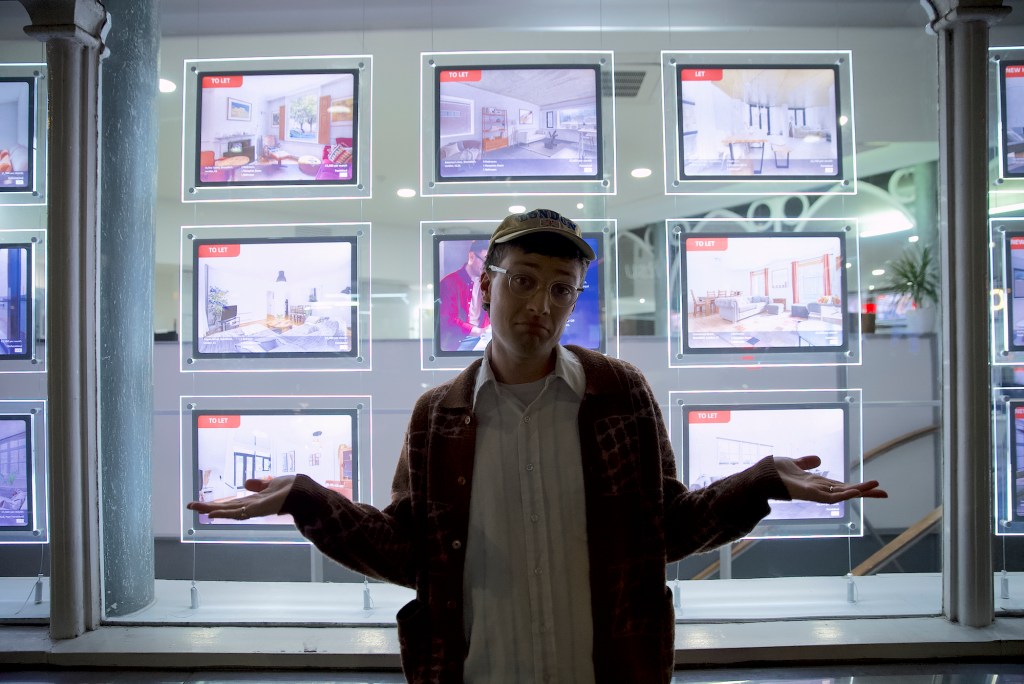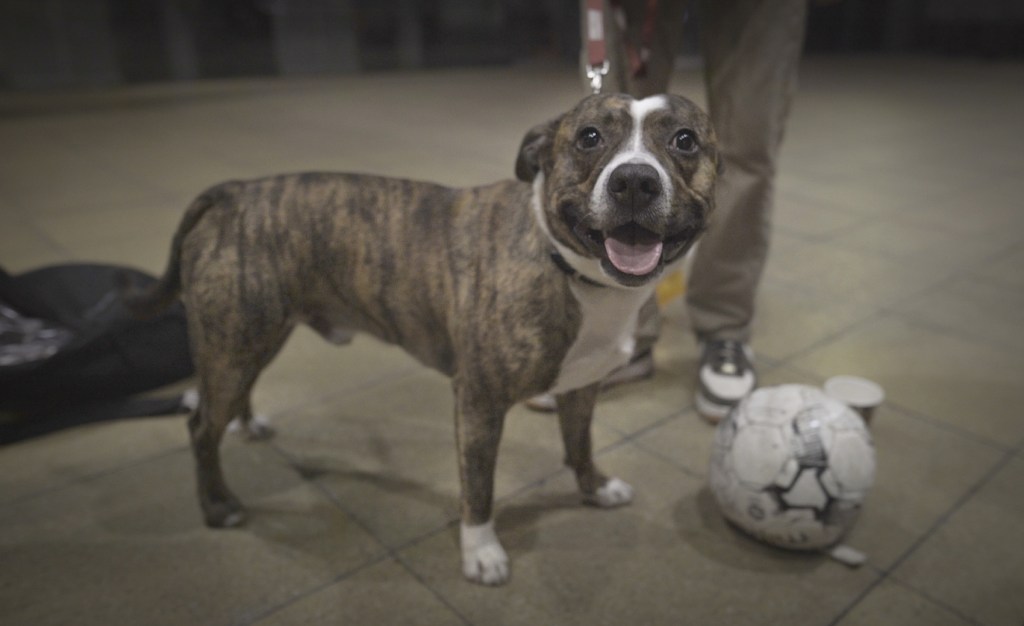Andy Hutchins says he owes his life to his dog, and it’s easy to believe him.
Formerly a heroin addict of 15 years, stealing to feed his habit – and, to his own mind, “no good to anybody” – Andy bought Bailey on the street as a three-week-old puppy, still blind, on the day in late 2011 when he left prison for the last time.
Videos by VICE
“I paid £12 for him and I haven’t touched heroin since,” says Andy. “He saves my life every day. I wake up, I think of drugs, but I walk my dog and ten minutes later my mindset’s changed.”
As benefits cuts continue to drive an increase in homelessness – which the Universal Credit rollout will likely exacerbate – studies bear out what it’s not hard to see: a dog can be a life-saving companion for members of the UK’s expanding homeless communities, as well as a health benefit for a demographic who commonly live with complex medical and mental health problems.
Earlier this year, spotting an opportunity to fill a vital gap, Sam Joseph and Jade Statt launched StreetVet, the UK’s first non-profit to provide outreach services for homeless dogs.
Vets were an unaffordable luxury for Hutchins, even before his recent benefits sanction. “An X-ray is £36,” he says. “I keep thinking, ‘If I can’t feed him, do I have to give him up?’”
WATCH: Shy Bairns Get Nowt – Food Poverty in the UK
Today, a year since its founders met, StreetVet operates in six regular locations across London, with over 50 volunteers on their roster and 100 more primed for the service to roll out across the UK. “So many people want to do this,” says Statt. “We’ve all walked past a dog and thought, ‘I wish I could help them.’ All we do is make that easier.”
“It’s something that a lot of vets feel,” Joseph agrees. “A lot of time in the veterinary world, there are animals with relatively well-off owners, they’re in good condition, and while they do need your help, they don’t need it as desperately as some might.”
StreetVet started in two places at once, at almost the same time. By the time Statt and Joseph met in a Camden pub in October of 2016, they’d both been operating under the same name for months, but each of them brought something different to the venture. Statt had secured the backing of the Royal College of Veterinary Services – the first homeless outreach project to do so – while Joseph sourced the software which is now the backbone of the operation, and encountered enthusiasm from the drugs reps who visited the Highgate practice where he works. Combining operations was a no-brainer, and now, Statt says, “Anything we can do in the consulting room, we can do on the street.”
StreetVet connects with their patients through two London-based outreach charities: Streets Kitchen and the Refugee Community Kitchen. Joseph and I run into Hutchins at one such outreach on a damp Thursday outside Hackney Town Hall, the dogs in attendance flinching at sporadic Diwali fireworks. Bailey gets a new towelled dog coat, fresh off the group’s Amazon wishlist, and a couple of weeks’ worth of tinned food.
“The people you meet aren’t very different from me at all,” says Joseph. A self-described ‘nice middle-class boy”, he’s happy to admit to a measure of naivety before the project began: “I found it really eye-opening, and kind of humbling. A couple of bad decisions or a bit of bad luck, and I could be in that position.”

That truth was illustrated last month when Statt met Dean Coleman, a former British Gas engineer who, at the time, was sleeping in his car with his dog, Huni.
Coleman, 35, went through a “bad phase” earlier this year. Suffering depression following a breakup, he began taking more and more time off from his job, fearful of losing focus while working with gas. “Someone could lose their life,” he says. He quickly fell into rent arrears, relying for a time on the finite patience of his landlord. “She was really good about it,” he recalls, “but eventually I got a letter through the door.” In September, the threat of court proceedings led Coleman to move out, and into his car. All he took was a suitcase and Huni.
“People talk about how homelessness can happen to anybody. Dean’s just the most obvious example of that to me,” says Statt, who was previously the director of Vetlife, a mental health charity for the profession. “I suffered myself. If I didn’t have the network of support and family that I did, it could have happened to me. So I just really wanted to help him.”
The pair met at a hostel drop-in in Watford. Struck by Coleman’s relationship with his dog, Statt put to use the contacts she’d made in the year or so since she’d first taken her backpack and stethoscope to the streets. She found the pair a hostel within 24 hours.
Coleman calls it his “fairytale ending”, to have grabbed onto a helping hand so soon after getting into difficulty. “I’ve been through my worst times, and I’ll bounce back,” he says. Since moving into the flat, Coleman is volunteering while looking to re-qualify as a gas engineer. “I never thought it would happen to me, but in a way I’m glad it did. It’s changed my whole outlook.”

Coleman had seen Statt just weeks earlier on the YouTube channel of Do Something for Nothing, the social media-driven community movement founded by barber Josh Coombes. “I didn’t know the time would come I’d actually meet the girl, and she’d save my life,” he says.
Statt describes meeting Coombes, and joining him on his walkabouts, as a “catalyst” – and there are clear parallels between his wildly successful solidarity project and what StreetVet does for London’s homeless communities.
“They can often feel like the value of their life is slipping through their fingers,” says Joseph. “If you can care for an animal, and make sure it’s healthy and happy, that gives you value – that mentality can be one of the first steps to turning your life around.”
“The real value of what we do,” he says, “is peace of mind for people who often have a lot more to worry about than a regular person.”
More
From VICE
-

Savannah Sly, dominatrix and co-founder of sex-worker vote mobilization group, EPA United. -

The author lurks outside an estate agents, Voigt-Kampff machine just out of shot. Photo by Zuka George -

Photo by Spencer Platt/Getty Images -

A sniffer dog checks bags in England, UK. Photo by Maureen McLean/Shutterstock
